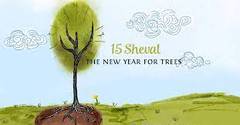Happy New Year to the Trees
02/08/2023 04:49:50 PM
Rabbi Eisenman
| Author | |
| Date Added | |
| Automatically create summary | |
| Summary |

Today is considered the first day of the year in calculating the age of a tree concerning certain specific halachos (Oral, Teruma, Maaseros), which for the most part are applicable (at least on a Torah level) only in the Land of Israel.
It is basically (according to the Mishna in Rosh HaShanah (1:1) an agricultural calendar date for calculating the age of a fruit-bearing tree.
Neither the Mishna nor the Gemara mentions anything significant about the day.
The classical sources do not say to eat fruit.
They do not say to have a "Tu B'Shevat Seder" nor "Peirus (fruit) or Tu B'Shevat Tisch."
In fact, one can learn through Shas and will not come away with any reason for thinking this day has any special meaning besides agricultural laws about the tree's age.
Therefore, it is somewhat surprising that the day has taken center stage on the Jewish calendar.
There are special "Tischen" in honor of the day, a special Haggadah which outlines a Tu B'Shevat Seder. The local stores are stocked to the ceiling with the most exotic fruit you never even knew existed.
Why?
Why did the Kabbalists and others embrace a day that, at first glance, has no special meaning or reason to be happy and convert it into a major (or at least a mini) Chag?
Since I am far from being a Kabbalist and have no familiarity with agriculture or tree planting, I present to you what Tu B'Shevat means to me.
Tu B'Shevat conveys one very strong theme, which is a foundational point of Yiddishkeit.
Namely, gratitude, or as we say in Hebrew, Hokoras HaTov.
We all, in one way or another, benefit from fruit.
This manifests in the regular consumption of fruit in our daily diets and the drinking of fruit juices, smoothies and other fruit-based foods and drinks.
Imagine a world without fruit?
Fruits, perhaps more than any other food, requires minimal preparation.
Hashem made it so that a tree-ripened peach is delectable, delicious, and ready to eat right off the branch.
There is zero preparation time needed in eating any tree-ripened apple, peach, pear, orange, nectarine, and so many more fruits.
Fruits are the original and genuine "fast foods" of the world.
As opposed to many vegetables (potatoes, yams), which require preparation and cooking before consumption, a fruit has no prep time.
After eating, there are no pots to wash, and very often, no utensils are needed to eat it.
Plus, fruits are naturally beautiful.
What is more beautiful than a fresh bowl of apples and oranges?
How many painters have painted a still-life portrait of fruits
The famous painting Still Life with Lemons, Oranges and a Rose is an oil-on-canvas painting by Baroque Spanish artist Francisco de Zurbarán completed in 1633.
The painting shows four citrons (Esrogim) and a basket of oranges.
The painting (among many other still-life portraits of fruit) is considered a masterpiece.
There is probably no other food group ready to eat, delicious and naturally as beautiful as fruit.
Despite the idiom "there is no free lunch," fruit demonstrates that Hashem gives us a free lunch (or at least a free snack).
When we look at a fruit today and are about to say a Brocha, think about how indebted and thankful we must be to Hashem.
He has created a world with a ready-to-eat,-no-prep-time needed- delectable edible object called fruit.
Yet, let it not stop there.
As you consider how grateful and indebted you are to Hashem, remember how grateful you must be to the human being who is serving you that fruit.
Don't forget the farmer who tilled the land and planted this fruit.
And don't forget the person who is serving you the fruit.
In short, Tu B'Shevat is a day where we take a deep breath and contemplate Hashem's benevolence to us and how much gratitude we owe Him.
And by doing so, we must remember to utilize that recognition of gratitude and express it profusely to every human being who serves us in one or another.
From the sanitation worker who picks up your trash to the mailman who delivers your mail, we must be thankful.
And especially gratitude is owed constantly to those closest to us, our parents, spouses, and friends, who, without them, we could not live one day in this beautiful world.
Thank you, Hashem.
And thank you all for taking the time to read this.
For without readers, am I even a writer?
Thank you.
Wed, October 22 2025
30 Tishrei 5786
Today's Calendar
| Rosh Chodesh Cheshvan |
| Daf Yomi - Rabbi Jacobowitz : 9:00pm |
| Daf Hashavua Chaburah - Rabbi Yehudah Kovacs : 9:15pm |
Friday Night
| Candle Lighting : 5:44pm |
Shabbos Day
| Hilchos Shabbos - Rabbi Eisenman : 8:15am |
| Bein Adam L'Chaveiro - Rabbi Eisenman : 11:15am |
| Daf Yomi - Rabbi Jacobowitz : 2:40pm |
| Massechta Taanis - Rabbi Eisenman : 4:30pm |
| Sixth Perek of Brachos - Rabbi Wiederblank : 4:30pm |
| Mesillas Yesharim w. Shalosh Seudos - Rabbi Eisenman : 6:12pm |
This week's Torah portion is Parshas Noach
| Shabbos, Oct 25 |
Candle Lighting
| Friday, Oct 24, 5:44pm |
Rosh Chodesh Cheshvan
| Wednesday, Oct 22 |
Important Links
Zmanim
| Alos Hashachar | 5:54am |
| Earliest Tallis | 6:21am |
| Netz (Sunrise) | 7:15am |
| Latest Shema | 9:57am |
| Zman Tefillah | 10:52am |
| Chatzos (Midday) | 12:41pm |
| Mincha Gedola | 1:08pm |
| Mincha Ketana | 3:51pm |
| Plag HaMincha | 4:58pm |
| Shkiah (Sunset) | 6:06pm |
| Tzais Hakochavim | 6:47pm |
| More >> | |
Privacy Settings | Privacy Policy | Member Terms
©2025 All rights reserved. Find out more about ShulCloud


